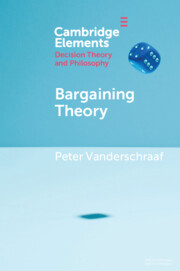Refine search
Actions for selected content:
2 results
5 - Conventional Behavior and Bargaining – Advice and Behavior in Intergenerational Ultimatum Games
- from Part II - Coordination, Distribution, and Trust Conventions
-
- Book:
- Advice, Social Learning and the Evolution of Conventions
- Published online:
- 09 March 2023
- Print publication:
- 09 March 2023, pp 111-137
-
- Chapter
- Export citation

Bargaining Theory
-
- Published online:
- 20 February 2023
- Print publication:
- 09 March 2023
-
- Element
- Export citation
